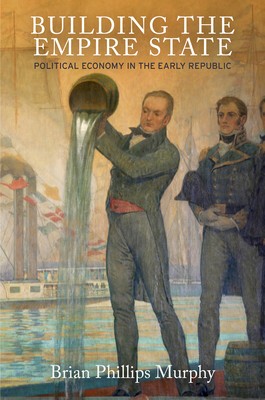
- We will send in 10–14 business days.
- Author: Brian Phillips Murphy
- Publisher: University of Pennsylvania Press
- ISBN-10: 0812247167
- ISBN-13: 9780812247169
- Format: 16 x 23.1 x 3.1 cm, hardcover
- Language: English
- SAVE -10% with code: EXTRA
Reviews
Description
Building the Empire State examines the origins of American capitalism by tracing how and why business corporations were first introduced into the economy of the early republic. Brian Phillips Murphy follows the collaborations between political leaders and a group of unelected political entrepreneurs, including Robert R. Livingston and Alexander Hamilton, who persuaded legislative powers to grant monopolies corporate status in order to finance and manage civic institutions. Murphy shows how American capitalism grew out of the convergence of political and economic interests, wherein political culture was shaped by business strategies and institutions as much as the reverse.
Focusing on the state of New York, a onetime mercantile colony that became home to the first American banks, utilities, canals, and transportation infrastructure projects, Building the Empire State surveys the changing institutional ecology during the first five decades following the American Revolution. Through sustained attention to the Manhattan Company, the steamboat monopoly, the Erie Canal, and the New York & Erie Railroad, Murphy traces the ways entrepreneurs marshaled political and financial capital to sway legislators to support their private plans and interests. By playing a central role in the creation and regulation of institutions that facilitated private commercial transactions, New York State's political officials created formal and informal precedents for the political economy throughout the northeastern United States and toward the expanding westward frontier. The political, economic, and legal consequences organizing the marketplace in this way continue to be felt in the vast influence and privileged position held by corporations in the present day.EXTRA 10 % discount with code: EXTRA
The promotion ends in 17d.11:55:32
The discount code is valid when purchasing from 10 €. Discounts do not stack.
- Author: Brian Phillips Murphy
- Publisher: University of Pennsylvania Press
- ISBN-10: 0812247167
- ISBN-13: 9780812247169
- Format: 16 x 23.1 x 3.1 cm, hardcover
- Language: English English
Building the Empire State examines the origins of American capitalism by tracing how and why business corporations were first introduced into the economy of the early republic. Brian Phillips Murphy follows the collaborations between political leaders and a group of unelected political entrepreneurs, including Robert R. Livingston and Alexander Hamilton, who persuaded legislative powers to grant monopolies corporate status in order to finance and manage civic institutions. Murphy shows how American capitalism grew out of the convergence of political and economic interests, wherein political culture was shaped by business strategies and institutions as much as the reverse.
Focusing on the state of New York, a onetime mercantile colony that became home to the first American banks, utilities, canals, and transportation infrastructure projects, Building the Empire State surveys the changing institutional ecology during the first five decades following the American Revolution. Through sustained attention to the Manhattan Company, the steamboat monopoly, the Erie Canal, and the New York & Erie Railroad, Murphy traces the ways entrepreneurs marshaled political and financial capital to sway legislators to support their private plans and interests. By playing a central role in the creation and regulation of institutions that facilitated private commercial transactions, New York State's political officials created formal and informal precedents for the political economy throughout the northeastern United States and toward the expanding westward frontier. The political, economic, and legal consequences organizing the marketplace in this way continue to be felt in the vast influence and privileged position held by corporations in the present day.

Reviews